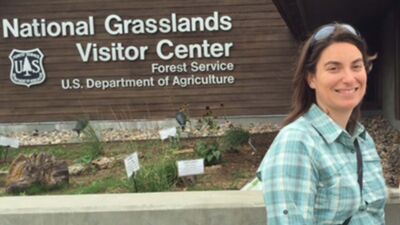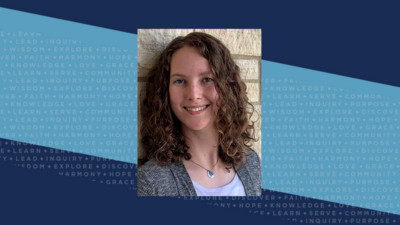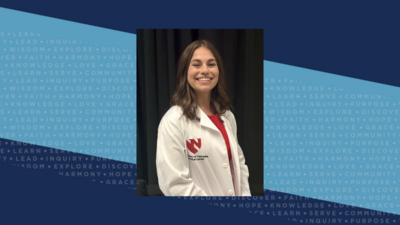Alumni Profile: Field Ecologist Jacqueline Ott thankful for Christ-centered experience at Concordia University, Nebraska

Jacqueline (Jackie) P. Ott ’06 really wanted to attend a Lutheran college where she could take religion or theology courses in addition to studying for her main degree. She was also seeking a campus life that included Christ-centered activities and worship opportunities. Interested in the sciences, she chose Concordia University, Nebraska because of the university’s Christ-centered focus and outstanding chemistry program.
Ott earned a bachelor of science degree in biology with minors in chemistry and mathematics. She also played clarinet in the university wind symphony during her time on campus. At Kansas State University, she earned a master of science degree in biology in 2009, a graduate certificate in applied statistics in 2011, and a PhD in biology in 2014.
“My favorite thing about Concordia was the sense of community and the people,” she said. “Concordia Nebraska was a place where you could enjoy all the benefits of being on campus. You start by going to class and enjoying a lecture on genetics from Dr. Gubanyi, then walking over to the library to study in a nice corner, then going to sit in the music department listening to the various choirs rehearse before going to band practice, then enjoying comradery over dinner with friends and finishing out the night with evening prayer. Each day you had the joy of saying hello to your fellow students as you went about your day and being greeted by caring faculty. In summary, Concordia provided a place to learn in a caring, Christian environment.”
Ott said each of her professors worked to challenge her and also help her see where she could apply their area of knowledge. “In the mathematics department, they encouraged me to take mathematical modelling to apply the knowledge that I had learned in other courses and then showed me future jobs that I might consider that would use that skill,” she explained. “In the science department, the faculty, especially Dr. Gubanyi, strived to provide tangible applications of the scientific principles we were learning whether it was tracking population sizes of mice on the local prairie, identifying the local flora, or providing new experiences to explore ecology by attending prescribed fire school and then applying it on our prairie restoration.”
She said Concordia Nebraska gave her an outstanding foundation in the basics of science that she needed for her current career. “With the smaller class sizes and the attentive professors, you really had to comprehend things to do well in class. A professor would catch on quickly if you weren’t understanding a concept,” she said. “We also had a lot of opportunities to write and have it critiqued more than I have seen in other larger public universities.”
Her time at the university also served to strengthen and develop her faith.“The religion classes did encourage me to dig into the Bible, but the majority of my faith development came from the on and off campus worship opportunities and the discussions of theology with students in the pre-seminary and Lutheran teacher programs,” she said. “Concordia offered a forum to learn and discuss how Lutheran theology can be applied in our daily lives. Lessons I learned during those years have continued to influence my decisions since graduating from Concordia. I am also thankful for the lasting Christian friendships I made there.””
Following graduation, Ott spent a summer working at the Northern Prairie Wildlife Research Center in Jamestown, North Dakota sampling wetland carbon emissions throughout Iowa and Minnesota. She then began her master’s degree at Kansas State University with a focus on grassland ecology. Kansas State University jointly manages the Konza Prairie Biological Station with The Nature Conservancy. While at Kansas State University, she learned a lot by being on the Konza Prescribed Fire Crew, serving as teaching assistant for numerous biology courses, managing the lab for her graduate advisor, and dissecting grass plants for her experiments. Her major advisor also invited her to work on his ongoing studies in Botswana. She remained at Kansas State University for a PhD following her master’s degree.
“As my PhD included some fieldwork in South Dakota at Wind Cave National Park, I became very familiar with the northern mixed-grass prairie and was able to find a post-doc position with South Dakota State University in conjunction with the US Forest Service following my PhD,” she said. “Eventually a research scientist position opened up in Rapid City, South Dakota. I have been working for the US Forest Service in the Rocky Mountain Research Station since 2016.”
Ott currently serves as a research ecologist for the Rocky Mountain Research Station of the US Forest Service. Her main objective is to provide the best available science for public and private land managers in the region. “Typically, I have multiple ongoing projects examining questions such as: How an invasive species will respond to prescribed fire? Does grazing during drought delay the post-drought recovery of the grassland? How does timber harvest affect understory herbaceous weed populations? What are the ecological effects and mitigation opportunities surrounding energy development in the Great Plains? How does grass grow and how does grass respond to disturbances such as drought, grazing, and fire?”
As a field ecologist, she spends ample time outside collecting data with a crew during the growing season. During the colder months, she analyzes the data and write up scientific publications and reports. There is abundant team coordination with other scientists as well as project management including overseeing research budgets and seasonal hiring throughout the year.
“The mission of the USFS is ‘caring for the land and serving people.’ It is pretty special to be a part of the team that manages our nation’s forests and grasslands which cover approximately 193 million acres in the United States,” she said. “I work at the nexus of where science gets applied to land management which involves both science and people. There is always something new to learn about God’s creation and the people that are using the natural resources we have been blessed to manage for the American public.”
Ott still stays in touch with many friends made during her time at Concordia. “Thanks to my Concordia friends, I have many godchildren that I enjoy spending time with and watching grow up. It is such a blessing to see this next generation grow in God’s Word,” she said. “I also spend time visiting with family and friends and enjoy outdoor activities such as hiking, kayaking, backpacking, cross country skiing, and biking. And surprisingly, I am still playing my clarinet after all these years. Everywhere I have lived, there has been a wind quintet as well as municipal bands that needed a clarinet.”
Are you interested in learning more about science department offerings at Concordia Nebraska? Read more here.
Related Stories


